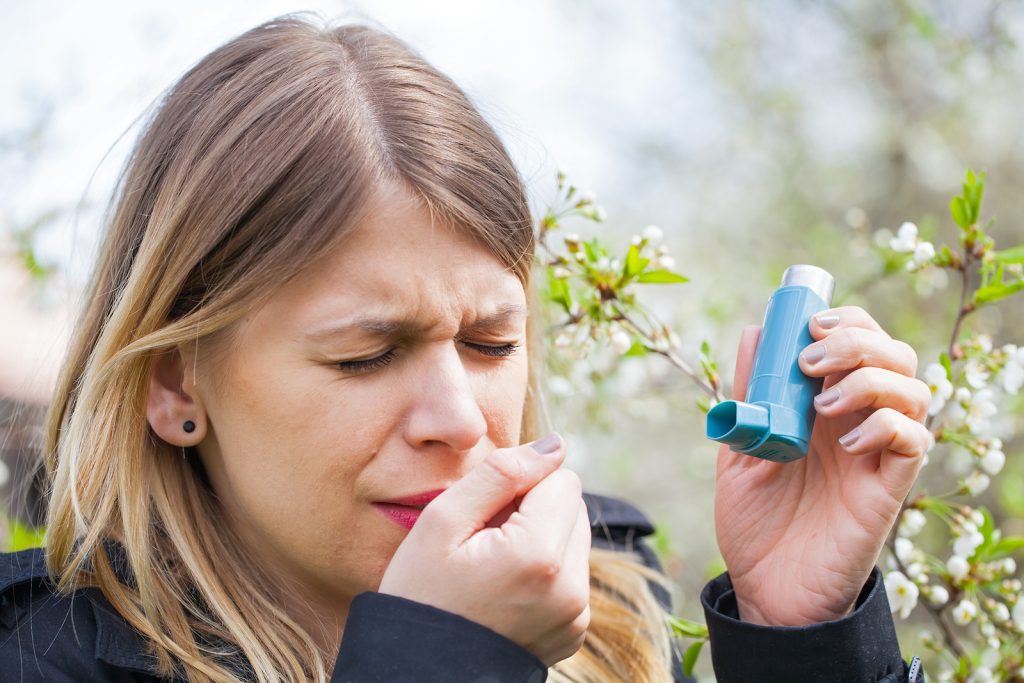A blocked nose, sneezing, watering eyes and disturbed sleep … Every year, people allergic to pollen fear the arrival of Spring. It’s a fact that in the last 30 years allergies have increased significantly. Allergic rhinitis, or ‘Hay Fever’ is common in the UK, affecting between 10% and 30% of all adults and as many as 40% of children (Pawankar R, et al, 2013) | Forest Medical – Spirometer Calibration
The exact causes of hay fever are not known, although hereditary seems to be an important factor. Indeed, if the mother or father is allergic, the probability that their child is allergic is 30 to 40%. If both parents suffer from the same allergy, the probability can be 70 to 80%.
Spring is not the only risk period
Pollens are among the main and most known causes of allergic reactions. From January to September, the air we breathe carries pollen from more than 40 plant species. “At the beginning of the pollen season, pollen grains are released by hazel, alder, yew and cypress trees but these pollens are relatively allergenic,” says Lucie Hoebeke, lead researcher at the National Pollen & Aerobiological Research Unit. “Their presence in the air is not worrying and causes little harm to the population. However, for a pollen to become allergenic it must be present en masse in the air, but also contain additional allergenic substances”.
The pollen season can vary, but it tends to increase in intensity towards the end of March with the appearance of Birch pollen. This is very allergenic and, in terms of the amount of pollen released into the air, this tree alone accounts for about a third of the tree pollen. Grass pollens appear between May and July, and Sagebrush closes the season around September.
From July to the end of September, allergic fungal spores (fungi) may also be present in the air. These can cause allergic reactions in highly sensitised individuals.
What pollen? What month?
To view an updated UK pollen calendar for 2018, check out The National Pollen & Aerobiological Research Unit’s data sheet.
Link to Fruit & Vegetable Allergies
Allergy to birch pollen may be associated with an allergy to certain uncooked fruits or vegetables. Swollen and itchy lips in the mouth and throat appear if one consumes these fruits. For example, allergy to birch pollen can be accompanied by a reaction to hazelnuts, apples, pears, peaches, cherries, apricots, plums, raspberries.
How to recognise allergic rhinitis?
The allergy has a number of very specific signs:
- the nose runs abundantly, and the flow is liquid and transparent;
- highly repetitive sneezing;
- the nose, eyes and palate sting;
- there is no fever or a sore throat;
- it does not stop, like a cold, after a week!
Adopt the right response
Pollen spreads in the air, so there is no easy way to completely avoid it. You can, however, reduce the inconvenience by:
- avoiding outdoor activities during high severity seasons;
- keeping the windows closed while driving;
- wearing sunglasses when the weather is sunny and windy, and the concentration of pollen is higher. This will reduce the contact between the eyes and the allergen.
- use paper tissues and dispose of them after use;
- shower and wash your hair before going to bed.
Link to Asthma?
Asthma is characterised by respiratory difficulty due to narrowing of the airways. Some asthmatics suffer from allergic rhinitis, which is an aggravating factor of their disease. Many people with allergic rhinitis go on to develop asthma which must be carefully managed.
Forest Medical Spirometer Calibration
Spirometry is a breathing or ‘lung function’ test. It’s one of the most common tests people with asthma or people who are being tested for asthma, are given. Your GP or asthma nurse will ask you to take a deep breath and then breathe out as fast as you can and for as long as you can through a mouthpiece linked to a ‘Spirometer’. You will have to blow a few times so your GP or asthma nurse can get an accurate result.
As with all medical equipment, Spirometers need thorough and comprehensive testing on a regular basis. Failure to adequately test a Spirometer puts it at risk of failure or of false readings being displayed from the equipment, which can have disastrous results.
We undertake thorough Spirometer Calibration to fully test your machines and ensure that they are safe and suitable for use.

